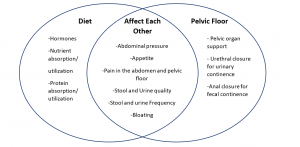Written By Katelyn Sheehan, PT, DPT, PRPC, PCES
Around the holidays and the new year there is a lot of focus on celebration and on trying to live a healthier lifestyle. Usually this includes changes in our usual diet or eating habits. Patients will often bring up how the holidays and their changes in diet are affecting their symptoms. So, I wanted to discuss how your diet and pelvic health can impact each other. A lot of patients that we see are aware that how much they drink, and what they eat can affect their bowel and bladder habits, but they don’t always know all the effects it can have on their pelvic floor function. In fact, some pelvic floor dysfunction can even cause us to alter our eating habits. In this article disordered eating could be defined as altered eating habits such as increased or decreased volume of food intake or altered food intake quality. This is including, but not limited to other eating disorders such as bulimia nervosa, binge eating, and anorexia nervosa.
Here are a few things our diet AND pelvic floor impact:

Since there is a large overlap between how our diet can impact us and the how the pelvic floor can impact us we often see a correlation between abnormal eating habits and pelvic floor dysfunction.
- One example of how eating can affect the pelvic floor is binge eating. Binge eating has been associated with menstrual changes, PCOS (Poly Cystic Ovarian Syndrome), abdominal discomfort including abdominal pressure and bloating which can impact pelvic organ prolapse.
- An example on how the pelvic floor can impact our diet is in patients with chronic constipation due to poor coordination of the pelvic floor may have a decreased appetite, or fear of eating, because it causes discomfort and fullness.
Our diet can also directly impact the function of the pelvic floor:
- Hormones: can affect our pelvic floor muscle elasticity, muscle growth and thus pelvic muscle function
- Nutrient and Protein absorption/utilization: This goes in line with hormones. Our food is a main source of vitamins needed for muscle growth and mobility.
If you have noticed your diet impacting your pelvic floor function, or you have noticed your pelvic floor symptoms impacting your diet please talk to a pelvic health physical therapist to help you devise a plan and see if your pelvic floor could be driving your symptoms. One thing you can do to help is keep a bowel/bladder log. You can use many apps, make your own, ask your therapist for one, or use this link
Learn More About JAG Physical Therapy
Make the first step towards healing with JAG PT's pelvic health and disordered eating program. Schedule your appointment today at any of our locations across NJ, NY, & PA to start your journey towards a healthier you. Contact us to learn more!
